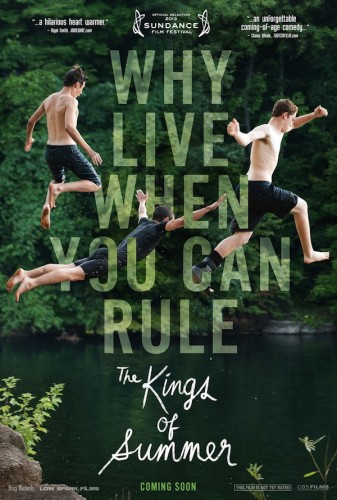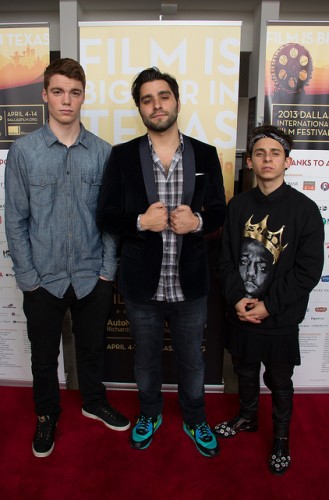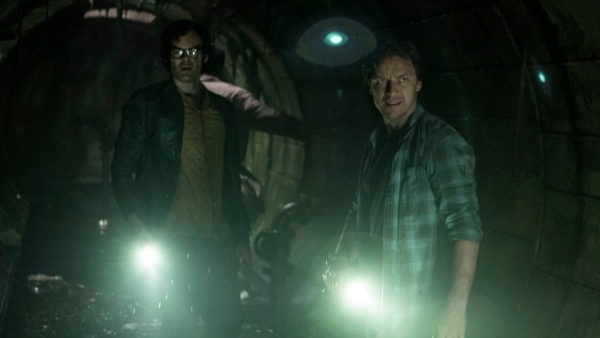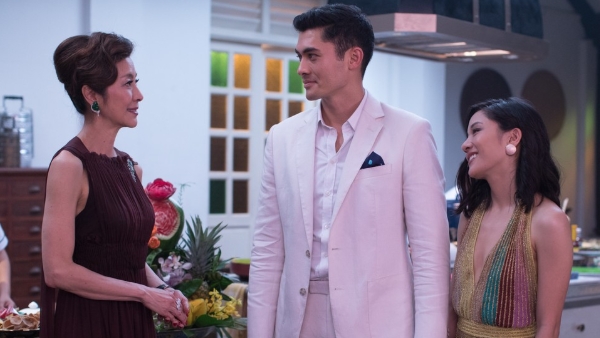Fifteen-year-old, Joe Toy, finds himself increasingly frustrated by his single father, Frank, who tries to control his life. Declaring his independence, Joe escapes to the woods with his best friend, Patrick (Gabriel Basso), and a strange kid named Biaggio (Moises Arias); the three build a house there—free from responsibility and parents. Families and friendships are tested in this rare comedy that succeeds visually and manages to be nostalgic while remaining sincere.
Go, See, Talk sat down with writer/director Jordan Vogt-Roberts, and the film’s young stars, Moises Arias and Gabriel Basso to talk about how the story evolved, improvisation, bringing cinematic flair back to comedy and filming Kings of Summer in Ohio.
When were you introduced to the script; have you worked with the writer (Chris Galletta) in the past?
Jordan Vogt-Roberts: As soon as I read Chris Galletta’s script I was in shock. I couldn’t believe that another director wasn’t attached to it. I knew right away that this was the story I wanted to tell for my first feature. John Hodges, who was working at Big Beach at the time, sent me the script. He has seen my short film Successful Alcoholics. Chris the writer and I had never worked together but we had a lot of mutual friends basically saying “you two need to meet!”. We’re attached at the hip at this point
There are many wonderfully defined and unique characters that drive the narrative. How did you work with the writer to create such memorable and relatable characters?
JV: Chris has a wonderfully unique voice and laid the groundwork for incredible characters and a world that is completely left of center. We did a lot of improv on set because Comedy revels itself in the torturous chasm that exists between the real and the ideal. Improvisation allows an actor to see all the shades and nuance on that spectrum, from tragic dirge to slapstick. This movie hits all of (those notes), and to achieve that I sent all the teenage actors through improv training. Not so they would be quick or witty, but so that they would be comfortable enough in their own skin that they could bring elements to the movie that only the brain of a teenager could conjure.
Can you talk a little about the casting as well?
JV: Casting was an incredibly long and difficult process because the kids needed to be perfect. I didn’t want to cast 25-year-olds playing 15. I wanted it to feel real and authentic because even though we have an enormous amount of adult comedic geniuses in the cast, the movie lives and dies with the performance of the kids. Everyone one of them needed to be great.
What was it like for you guys (Moises and Graham) as actors to work on a film that uses so much improvisation, and is that something you’ve done in past films or was that different for you?
Moises Arias: The first week it was difficult getting into the character, not overdoing it and not making it a gimmick, and I think Jordan is really talented at improvisation, so by the end, it was a bunch of stuff Chris and Jordan had pitched to me in different takes.
JV: By the end of the shoot they just all took over the characters, so the things he was doing naturally were just on point…It’s about giving them the freedom to bring actual childlike wonder to it, but still making sure you’re always serving the actual characters. Improv as far as I’m concerned is a life skill.
MA: It taught me a good base for timing and coming up with my own things. I’ve done some improv before…but definitely not as much as on Kings of Summer where we would literally do just two minute straight of whatever came to our minds
JV: I do a lot of long takes, and the caveat to all this is that you can’t do that without a good base, and Chris (Galletta) gave us a really wonderful base to work from with his script.
This kind of improvisation eventually led to the creation of the trailer’s opening scene...
JV: The drum scene happened on our off day, me, the director of photography, writer and (Moises and Gabriel) and Nick Robinson went out into the woods, and that entire montage of them just being boys was shot just the three of us. All the audio for that is shot on my iPhone, and it was just the most pure wonderful day, giving them the freedom to just be boys. It was just one of those rare moments.
MA: It’s honestly what we look back on every time someone asks what our favorite part was. There wasn’t a lot to do in Ohio, so we ended up working on our off days, and that particular scene is now like the core of the film. It was honestly all improvised – majestically choreographed in my mind – and it was just one of my favorite times shooting.
(The guys then did a reenactment of the sequence by drumming their hands on the table to the different beats)
JV: The shoot started with everyone there, all the adults and all of the kids, and then one by one the adults went home. Then it was just and a bunch of kids me…and we had no idea what that transition was going to be like, and they all just stepped up.
Graham Basso: It was a lot of work, but we loved the film and we saw how much passion went into it, and we forced ourselves to really give it everything we had. Everyone was amazing, and it was just an extraordinary experience for me and I feel blessed to be a part of it.
The film confronts conflict between characters – in both their familial and romantic relationships – in a dry, sometimes dark, comedic way that can be challenging to pull off; how did you approach the tone?
JV: I love movies that play with tone, and I think UP is a perfect movie for the way it balances extreme highs and lows. When a comedy can ride the highs and lows of life to make the comedy funnier and the drama have more weight, I think it makes everything more poignant and real. There are no greater highs and lows than with family relationships…so that seemed like a perfect access point to ground people in a world that is simultaneously funny, absurd and dark – just like life.
The cinematography is beautiful in nature/wood scenes, and it was interesting to see that juxtaposed against the backdrop of the suburban scenes that felt much darker. Was that something that was conscious for you and the cinematographer when filming and how do you see that contributing to the overall narrative?
JV: I believe that comedy has been put in a rather boring box over the last few decades. Not that this is a romantic comedy by any means but as an example of how far we’re deluded comedy: Rom-Com is a dirty word these days but it’s easy to forget that Annie Hall was a rom-com. I wanted this movie to bring back technical filmmaking with cinematic flare and scope to comedy. I believe that comedy can be visually beautiful, striking, lyrical and ethereal in a way that accents the humor to creates something bigger than the sum of its parts.
Ross Riege, the director of photography and I were constantly shooting B-roll of the kids messing around and seeking out beautiful nature images to help convey the sense of freedom the kids felt. You never know how impressionistic elements of a film are going to come together until you’re in the edit and once we found the right balance I was thrilled. Someone recently described the film to me as “Terrance Malick meets Super Nintendo” and I can’t think of a better honor if people feel that way.
____________________________________________________________________________________
The 2013 Dallas International Film Festival runs from April 4th to April 14th. The Kings of Summer will open to a limited release May, 31, 2013.



